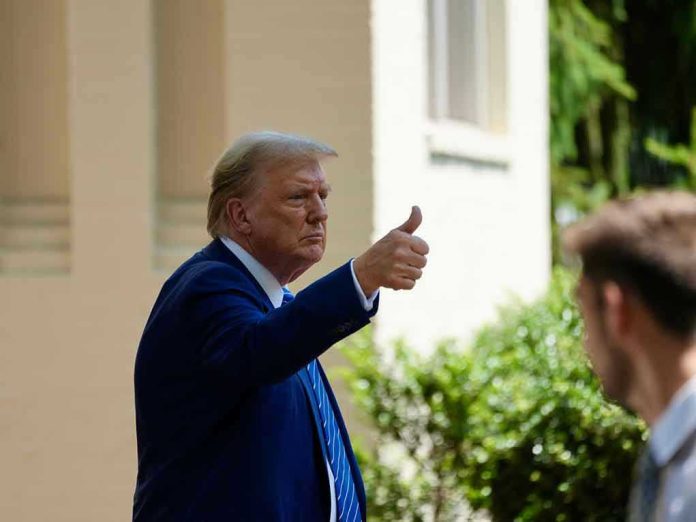
Democrats are playing a dangerous game, and if they force a government shutdown, President Trump’s trap is already set—with consequences their party may regret for years to come.
Story Highlights
- Democrats threaten a government shutdown to secure policy wins, especially on health care subsidies
- President Trump and GOP leaders prepare to assign blame squarely to Democrats if a shutdown hits
- Internal Democratic divisions and pressure from progressives intensify the standoff
- The outcome could reshape political strategies and public trust before the 2026 midterms
Trump’s Shutdown Chessboard: Strategy and Stakes
President Trump is not approaching the shutdown brinkmanship as a bystander. With Republicans controlling both chambers of Congress but lacking a Senate supermajority, Democrats sense leverage. Their refusal to back a GOP funding bill, especially without expanded Obamacare subsidies, is a calculated risk. Trump’s team, however, is laying the groundwork to portray Democrats as responsible for any government paralysis, confident that the optics of obstruction will stick. The White House messaging machine is primed to frame Democrats as putting their ideological wish list above the paychecks of federal workers and the delivery of essential services, betting that the public’s frustration will turn into political capital for the GOP.
The standoff is not just about numbers on a ledger—it’s about control of the political narrative. Trump’s allies believe that if a shutdown occurs, their readiness to respond and rapid-fire blame game will inflict lasting damage on Democratic credibility, especially as Americans experience service disruptions firsthand.
Democratic Gambit: Unity, Division, and High-Risk Tactics
Senate Minority Leader Chuck Schumer faces a dilemma familiar to anyone trying to herd political cats. Progressive Democrats, frustrated by repeated compromises, are demanding a no-compromise approach, while moderates fear the wrath of voters who remember the pain of past shutdowns. In March 2025, Schumer was already under fire for backing a temporary funding bill, drawing calls for his ouster from the party’s left flank. Now, as the October 1 deadline looms, Democrats’ internal divisions spill into public view. Some see the shutdown threat as the only way to force Republicans’ hand on health care and social spending; others worry it’s a trap set by Trump, who remains a master of political theater. The party’s gamble is that Republicans will blink first—but if not, Democrats risk being cast as reckless gamblers with the nation’s welfare.
Party unity is fragile, and the stakes are higher than ever. The pressure from progressive activists and outside groups has never been more intense, yet the consequences of miscalculation—lost wages, delayed benefits, and a public backlash—could haunt Democrats deep into the next election cycle.
Shutdown Fallout: Who Pays, Who Gains, and the Public’s Patience
If the shutdown commences, the immediate casualties are federal employees, contractors, and everyday Americans relying on government services. Economists warn that even a short disruption could rattle markets and dent consumer confidence. The health care sector, already jittery over subsidy uncertainty, faces new headaches as funding stalls. For the millions who depend on timely Social Security checks, veterans’ benefits, or small business loans, the shutdown is not an abstract fight—it’s a punch to the wallet.
Politically, the blame game is underway before the first agency doors close. Trump and GOP leaders, recalling the lessons of previous shutdowns, have crafted a narrative that paints Democrats as hostage-takers. Meanwhile, Democratic strategists argue that standing firm is necessary to prevent further erosion of social safety nets. Pollsters and pundits warn that, historically, no party emerges unscathed from a shutdown. The risk for Democrats: if Trump’s messaging sticks, they could face voter wrath in the 2026 midterms; if they back down, they risk alienating their base and emboldening Trump’s hardline tactics.
Expert Analysis: High-Risk Poker and the American Public
Political analysts agree that Democrats’ move is a classic high-risk poker play. If they succeed, they could extract real policy concessions and energize progressive voters. If they fail, Trump will have engineered a narrative of Democratic overreach and dysfunction. Scholars of American politics emphasize that shutdowns rarely yield clear winners—except for those who can most effectively assign blame. The divided media landscape ensures that both parties will have their champions and detractors, but the ultimate verdict will come from voters living with the aftermath. As the deadline approaches, the only certainty is uncertainty, and the only safe bet is that both parties are gambling with public trust.
Outcomes of this standoff will reverberate beyond Washington. If Democrats hold firm and win concessions, the shutdown will be hailed as a turning point in progressive resistance. If Trump’s strategy prevails, Democrats may find themselves scrambling to repair their reputation as responsible stewards of government. Either way, the next chapter in America’s shutdown saga is being written now—and no one knows whose signature will be etched deepest in the public’s memory.







